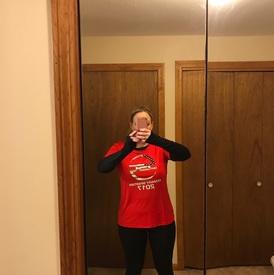What's the reasoning behind eating AT LEAST your BMR?
Replies
-
Wow. You really have to ask?
BMR is absolute minimum. No moving. Just laying in bed.
When you get up, go to work, walk to the pub, have a beer and a sandwich, then go to the gym and lift heavy weights for an hour, all that is on top of BMR. That's your TDEE, which you seem to know o by are you asking. So, most people gain weight because they eat way above their TDEE. If you eat at TDEE. You will neither gain nor lose. If you eat less than TDEE, you lose. But, because your basic survival needs are at BMR, You don't want to eat below BMR. Somewhere above BMR and below TDEE is your weight loss program.
I hope that's clear.
It is clear; however, it doesn't answer my question as it completely disregards my argument.
Ok -- how about the following since you understand that below TDEE already creates a deficit.
Eating below your BMR is ok under certain conditions -- limited amount of time and for someone who has nutrient/calorie stores.
The issue isn't that you have to eat above a certain magical number. It is that at eating well-below a reasonable deficit you are going to have the following things going on:
1) insufficient nutrients - the less you eat, the less likelyhood you will have sufficient diversity and volume of essential nutrients. oops.
2) protein catabolic/anabolic balance - at large deficits the on going processes will tend to shift to a balance which favors using up protein from your muscles elsewhere. One particular place is nutrient transport - do you prefer to have muscles or have them go to make albumin miscelles to tranport food (that you aren't eating). Everyone that loses weight fights with this balance. Large deficits make it harder, much harder. About 1-3% of your protein is being replaced every day. One wants to assure that their is sufficient nutrients to keep that equilibrium in the right direction. Otherwise oops.
3) energy levels - if you are active, lower energy will impact performance in activities and general life. oops.
4) metabolic processes governed by hormonal balance - these process manage things your metabolism but also like hair, hunger, mood, skin and brain function. Long term you really do not want to screw up with that. big oops.
4b) fast drops impact your body in other ways: loose skin, internal elasticity and kidney stones are some of the other macro physiological risks.
5) mental - large deficits are mentally hard and lead to some disfunction (some of it driven by point 4) - this includes simply dropping the lifestyle change (too hard), binging, depression, moodiness to full eating disorders (see startvation studies). Another big oops.
6) lifestyle - one should be developing long term habits that work for a lifetime, and in all situations - below BMR eating is boring, painful and socially difficult.0 -
Can somebody help me with this whole BMR and TDEE business? I've really plateaued recently and think it could be because I'm not eating enough? I really don't know how to work it out and MFP says to lose 2lb a week I need to consume 1200 which meant I was constantly hungry. I added 1300 to allow for an extra snack and whilst I've lost over 40lbs in just over a year, recently I either maintain or lose a maximum of 1/2lb a week.
Thank you!0 -
My BMR is about 1500. My personal trainer thinks I should have between 1400 and 1500 calories a day, so BMR or even less.
I workout 5 times a week - PT, gym, Zumba, spinning, aerobics - I have 2 small children and I work part time as a teacher. I am always on the go. I've lost a lot of weight and am down to my last 13lbs. It seems to have worked for me.0 -
This content has been removed.
-
I doubt your BMR is 1500. That's Probably TDEE.
Why? That seems reasonable to me. My BMR is around 1500 and my TDEE is closer to 1900-2100 (I forget it's been awhile since I calculated it.)0 -
This content has been removed.
-
0
-
Ok -- how about the following since you understand that below TDEE already creates a deficit.
Eating below your BMR is ok under certain conditions -- limited amount of time and for someone who has nutrient/calorie stores.
The issue isn't that you have to eat above a certain magical number. It is that at eating well-below a reasonable deficit you are going to have the following things going on:
1) insufficient nutrients - the less you eat, the less likelyhood you will have sufficient diversity and volume of essential nutrients. oops.
2) protein catabolic/anabolic balance - at large deficits the on going processes will tend to shift to a balance which favors using up protein from your muscles elsewhere. One particular place is nutrient transport - do you prefer to have muscles or have them go to make albumin miscelles to tranport food (that you aren't eating). Everyone that loses weight fights with this balance. Large deficits make it harder, much harder. About 1-3% of your protein is being replaced every day. One wants to assure that their is sufficient nutrients to keep that equilibrium in the right direction. Otherwise oops.
3) energy levels - if you are active, lower energy will impact performance in activities and general life. oops.
4) metabolic processes governed by hormonal balance - these process manage things your metabolism but also like hair, hunger, mood, skin and brain function. Long term you really do not want to screw up with that. big oops.
4b) fast drops impact your body in other ways: loose skin, internal elasticity and kidney stones are some of the other macro physiological risks.
5) mental - large deficits are mentally hard and lead to some disfunction (some of it driven by point 4) - this includes simply dropping the lifestyle change (too hard), binging, depression, moodiness to full eating disorders (see startvation studies). Another big oops.
6) lifestyle - one should be developing long term habits that work for a lifetime, and in all situations - below BMR eating is boring, painful and socially difficult.
This is a very nice explanation of the effect of large deficits and it makes perfect sense. But that also confirms that the BMR is not a magic number and it's used as a rule of thumb, right? What I'm trying to say, using x% off the TDEE as a lower limit would also serve the same function - is that correct?0 -
I doubt your BMR is 1500. That's Probably TDEE.
The average woman's TDEE is 2000, and for men is 2500 - a TDEE of 1500 is extremely low.0 -
Your body will do whatever it can to survive. Push it to that point and you will not get the kind of weight loss you are looking for... if any. End of story. In layman's terms, you'll be pushing ****e uphill in the weight-loss department.0
-
I doubt your BMR is 1500. That's Probably TDEE.
Um, yes it is. I'm a 35 year old 5'6 female who weighs 163. I workout 5 times a week as stated and am always on the go. I calculated my TDEE once, but can't remember what it was. It was over 2000 though.
According to this http://www.bmi-calculator.net/bmr-calculator/ my BMR is 1509.0 -
Congratulations on a fantastic troll thread, OP!0
-
Why would the body burn muscle before fat?
Fat is way more calorie dense!
Especially when you have adequate protein and resistance training.
The body will try to burn muscle while on a (very) high deficit because muscle uses more calories for maintenance. If you eat enough protein and use those muscles, the loss should be smaller. However, too large deficit may not leave u with enough energy for strength training. Smaller deficit is safer, healthier and easier to maintain.0 -
This content has been removed.
-
Why would the body burn muscle before fat?
Fat is way more calorie dense!
Especially when you have adequate protein and resistance training.
The body will try to burn muscle while on a (very) high deficit because muscle uses more calories for maintenance. If you eat enough protein and use those muscles, the loss should be smaller. However, too large deficit may not leave u with enough energy for strength training. Smaller deficit is safer, healthier and easier to maintain.
in body
1 lb of fat = 3500Cal
1 lb of muscle = 600Cal
dietary value
1g of fat = 9Cal
1g of protein = 4Cals
pure
1 lb of fat = 4082Cal
1 lb of muscle = 1814Cal
maintenance (not to sure about the accuracy of this)
1lb of fat = 2Cals
1lb of muscle = 6Cals
to me it doesn't really make sense to burn the muscle from a mathematics standpoint.
also plz read article i posted earlier.0 -
BMR is basic of basic functions to just stay alive while in a coma or bed rest. I don't want to eat less that that bare minimum.
TDEE I'd what is needed to stay alive, go about your day, work, play. And maintain your current weight.
So TDEE minus about 20% is less than you need to live your normal activity level lifestyle, so your body burns stored resources... Yet is enough to be able to breath and pump blood and have brain activity
I have read that if a person has a lot to,lose, that they can eat less (than the average -20%?)... Not sure0 -
BMR is also the number of calories you need to consume to maintain your current fat stores. Yeah. I don't mind eating a bit less than that.0
-
Your maintenance numbers are reversed, it takes 6 calories to maintain muscle, and only 2 or 3 to maintain fat.Why would the body burn muscle before fat?
Fat is way more calorie dense!
Especially when you have adequate protein and resistance training.
The body will try to burn muscle while on a (very) high deficit because muscle uses more calories for maintenance. If you eat enough protein and use those muscles, the loss should be smaller. However, too large deficit may not leave u with enough energy for strength training. Smaller deficit is safer, healthier and easier to maintain.
in body
1 lb of fat = 3500Cal
1 lb of muscle = 600Cal
dietary value
1g of fat = 9Cal
1g of protein = 4Cals
pure
1 lb of fat = 4082Cal
1 lb of muscle = 1814Cal
maintenance (not to sure about the accuracy of this)
1lb of fat = 6Cals
1lb of muscle = 2Cals
to me it doesn't really make sense to burn the muscle from a mathematics standpoint.
also plz read article i posted earlier.0 -
maintenance (not to sure about the accuracy of this)
1lb of fat = 6Cals
1lb of muscle = 2Cals
If fat uses more energy than muscle then gaining muscle shouldn't raise the metabolic rate.
Muscle is three times (?) more metabolically active at rest than fat. So i guess, it would be 2 calories fat, 6 calories muscles.
And it makes perfect sense for the practically starving body to use up muscle first to save energy.0 -
I don't understand where the logic comes from either as far as I can tell if you don't eat above your BMR you body will take your stored energy instead and since it's a slower method than just eating something you will feel tired
of course to do this you must have stored energy to use0 -
Your maintenance numbers are reversed, it takes 6 calories to maintain muscle, and only 2 or 3 to maintain fat.
Oh, I was too slow. It sucks being a perfectionist and checking things twice 0
0 -
This thread depresses the crap outta me. Why is it so difficult to just eat slightly less than your TDEE, work out, eat like a normal human being and slowly and safely lose fat. Why do so many posters on this thread have to chuck themselves on the starvation bandwagon?
Theres so much info out there so help you lose safely and keep it off for good. VLCD's will generally not be healthy or be easy to maintain in the long term. Is it rocket science to work out yuor TDEE and comfortably shed fat? No, it is not. I have literally no idea why so many people on these boards seem to make weight loss as uncomfortable and hard as physically possible. It's brain numbing. Between this thread and the mulitple 1200 calorie threads of late I've pretty much had enough of the forums for a while I think. Some of the *kitten* on here lately is just damn right unhealthy and the members encouraging others to eat VLC should be ashamed of themselves. Educate yourselves and stop passing on bad info.0 -
This content has been removed.
-
I'd rather not feel like I'm gonna faint when I stand up from lack of food. I'd rather lose weight AND eat like a boss.0
-
my body has learned to tell me when it's hungry. I have learned what my day can look like and still maintain. I don't pay attention to the days I exercise and one of the sites tells me I can eat a gazillion more calories. I eat when I am hungry and that's it. ( ok except for my popcorn at night..that's habit but a healthy one). I gave up worrying about those letters ( you know) BMR TDEE ..etc and so on and so forth.
I feel good..and just had my yearly and am healthier than the doctor I see that is my age. GO ME!0 -
Well done, OP. I could never troll with such subtlety!0
-
This thread depresses the crap outta me. Why is it so difficult to just eat slightly less than your TDEE, work out, eat like a normal human being and slowly and safely lose fat. Why do so many posters on this thread have to chuck themselves on the starvation bandwagon?
Theres so much info out there so help you lose safely and keep it off for good. VLCD's will generally not be healthy or be easy to maintain in the long term. Is it rocket science to work out yuor TDEE and comfortably shed fat? No, it is not. I have literally no idea why so many people on these boards seem to make weight loss as uncomfortable and hard as physically possible. It's brain numbing. Between this thread and the mulitple 1200 calorie threads of late I've pretty much had enough of the forums for a while I think. Some of the *kitten* on here lately is just damn right unhealthy and the members encouraging others to eat VLC should be ashamed of themselves. Educate yourselves and stop passing on bad info.
^^^THIS.
Everyone wants things to happen as quickly as possible, and they just disregard any information that will not get them from point A to point B as fast as they think they should go. Personally, I am quite happy losing 1/2 pound a week or less, it's not a race, and this way, I can stay healthy, give my body everything it needs, be KIND to my body, and live this way for the rest of my life. I won't tell anyone else what to do, hell, I don't know if my way is the right way, but it works for me, I'm healthy, I'm losing weight, I'm not hungry, I have allowances for treats, I forgive myself if I make mistakes, and that's all I have to offer.
I wonder how many calories overthinking something uses?
People who want to eat too little already seem to have all the answers, and will just continue to argue that their way is the right way, so I say, let them do whatever they want to do.0 -
This discussion (what I've read - I only had time for the first page, so sorry if this is a rehash) seems off course to me. Calories are only one part of the puzzle. You could eat the correct amount of calories and still starve to death if you didn't get any good nutrition. It's about getting the correct amount of nutrition, not just calories.
Just be patient, eat right and exercise. Whole foods, quality nutrients, in the right amounts, plus exercise is THE ONLY METHOD OF PERMANENT WEIGHT LOSS THAT WORKS. I'm sorry, but those are the facts.0 -
Think of it like this. If you always eat below your BMR, you WILL eventually starve to death. Now, your body doesn't have a mind of it's own. It doesn't know that you're on a diet and that the calorie restriction is temporary. So, the longer you eat below your BMR, the more convinced your body is that you're starving to death. It will then try to save itself by lowering it's own BMR by burning muscle.0
-
Please help with this one.........Can I ask what you're supposed to do if 20% off your TDEE is less than your BMR?
Should I up my exercise/activity so my TDEE is higher so minus 20% is still more than BMR? - Seems the healthiest most sensible way to follow this rule.
Just eat my BMR?
OR
Eat TDEE minus 20% anyway?
I'm not convinced my numbers are right, I worked out BMR to 1700 (roughly) and TDEE to 2100 which is you take 20% means I should be eating 1600 calories. Does my BMR sound high at 1700?? I figured it would be around the 1200 calories mark! I've been following a 1300 hundred calorie diet (on the advice of MFP) and I'm worried I'm actually eating far too little.
Any help would be much appreciated, it may sound ignorant but I've never heard these things before and I'm now thinking I'm not losing weight in the healthiest/most effective way.
Thank you.0
This discussion has been closed.
Categories
- All Categories
- 1.4M Health, Wellness and Goals
- 395.9K Introduce Yourself
- 44.1K Getting Started
- 260.7K Health and Weight Loss
- 176.3K Food and Nutrition
- 47.6K Recipes
- 232.8K Fitness and Exercise
- 448 Sleep, Mindfulness and Overall Wellness
- 6.5K Goal: Maintaining Weight
- 8.6K Goal: Gaining Weight and Body Building
- 153.3K Motivation and Support
- 8.2K Challenges
- 1.3K Debate Club
- 96.4K Chit-Chat
- 2.5K Fun and Games
- 4.4K MyFitnessPal Information
- 16 News and Announcements
- 18 MyFitnessPal Academy
- 1.4K Feature Suggestions and Ideas
- 3K MyFitnessPal Tech Support Questions
















